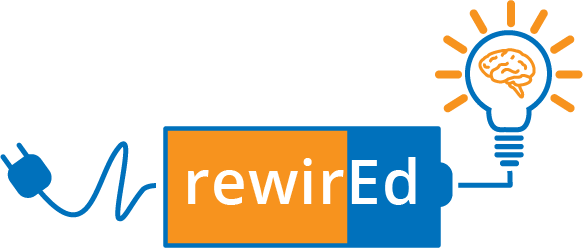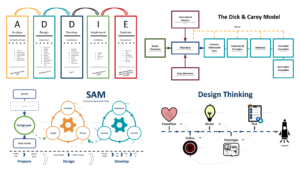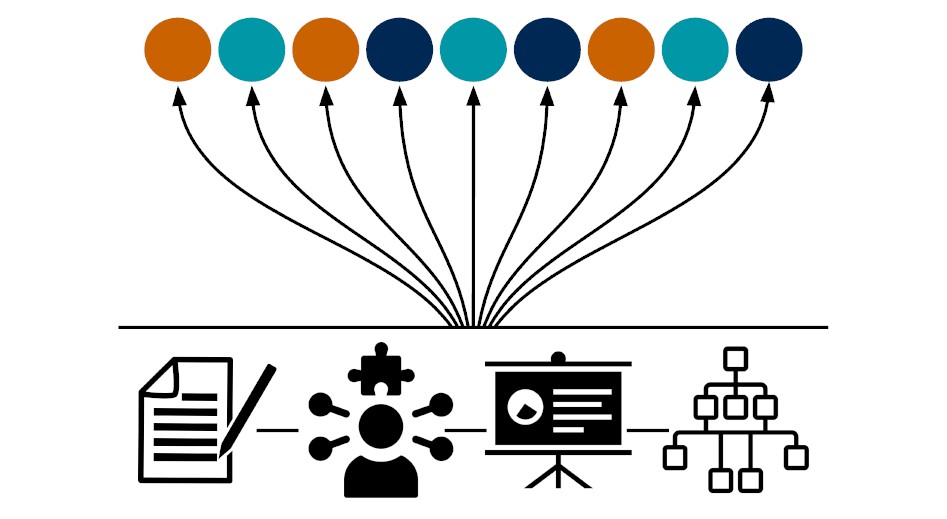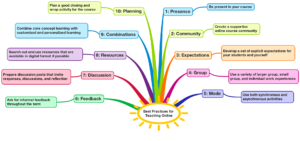We often mistake our class sessions for being the most important part in the learner’s experience. Every part of the experience is important, but what we do in-between class sessions is where the most information is turned into knowledge. As such, it is also the space where the most information can be lost. So, for instructors, it is important to design multiple low-stakes assessments, both in and outside of the class sessions, which challenge learners to actively recall and connect new information to existing knowledge.
Below is a visualization of how memory essentially works. Understanding this is essential when designing and timing activities and assignments.

This visualization of Cognitive Information Processing is a blend of the Atkinson-Shiffrin ‘Multi-Store’ model and Alan Baddeley’s model of ‘Working Memory’. It is also informed by the work of George Miller, Anders Ericsson, Robert Bjork, Hermann Ebbinghaus, and Fergus Craik.
Retrieval and Elaborative Rehearsal
‘Retrieval’ (actively recalling information) and ‘elaborative rehearsal’ (building more associations with information) is a necessity for forming vivid and long-lasting memories. The better encoded the info through elaboration (connecting it to other experiences, beliefs, and knowledge), the more vivid and prominent it will be. The more often we retrieve (bring to mind) that info, the stronger our ability to access it for a longer amount of time. As a result, the encoding becomes multi-dimensional, resulting in a lack of interference from other related information and a much less likelihood of decay from disuse.
It is important to note that ‘forgetting’ is mainly caused by:
- Proactive/Retroactive Interference– The prominence of old/new information suppresses new/old information. It’s like getting used to the controller configuration of a new video game or remembering the configuration of an old one you haven’t played for awhile.
- Poor Encoding– Information not properly associated with existing knowledge or experiences can not be accessed because it isn’t fully there.
- Decay– Not bringing information into working-memory from long-term memory weakens associations so much we struggle to access it. Think of memory decay like a muscle being atrophied.
This is why small and consistent homework is so important. If you have ever taken a course that only had two exams and/or a paper, then you’ve been set up to cram, pass, and forget. If you’ve been in a class with lots of small homework assignments, chances are you have developed a more dynamic and long-term understanding of the material, and thus it will be of value to you now and in the future.
Here is a visualization to help you map each week of instruction to get the most out of retrieval and elaborative rehearsal with low-stakes assessments:

I hope this helps you in your quest to create amazing blended learning 🙂
A Note on ‘Trauma’ as a Cause of Forgetting:
Any hyper-stressful experience floods the brain with a hormone called cortisol. This horrendous amount of cortisol in the brain causes activated neurons to overdose on calcium. Too much calcium in neurons causes them to fire rapidly until they literally burn out. Imagine putting jet fuel in a VW Bug. As a result, the information encoded in them is destroyed.
Now, a little bit of stress is a good thing for memory because ARC proteins in the brain can manage moderate amounts of it. Then, any damage done gets repaired with a growth factor (fgf2) which allows scathed neurons to encode the experience as well as it grows new neurons which contain the new information.
“Trauma”, however, means an unmanageable amount of cortisol. Trauma is very unlikely to happen in a classroom setting, hardly being a result of poor teacher preparation. However, that doesn’t mean that the classroom experience can’t exacerbate existing trauma. So, apply practices to empathize with your students as well as set realistic expectations for them to achieve consistent success. We don’t know what they’ve been through or are currently going through. Life is pain, hell is other people, and time is relentless. So, the least we can do is not be an asshole to those just trying to learn.



